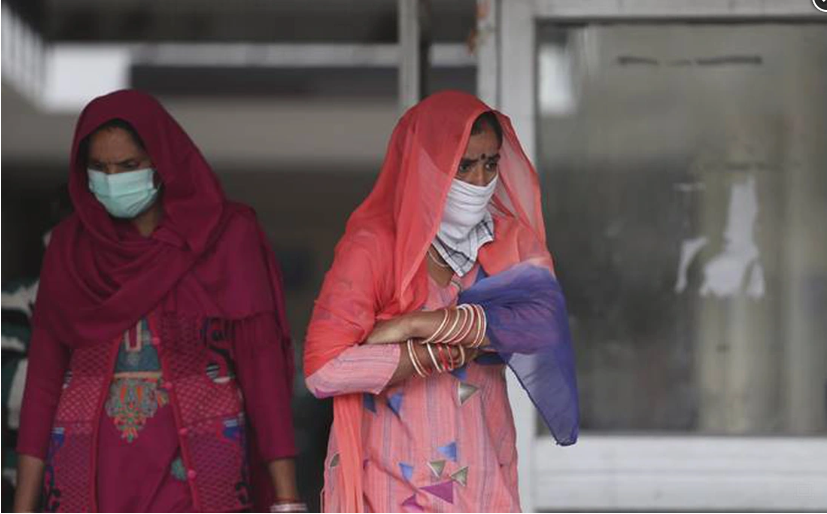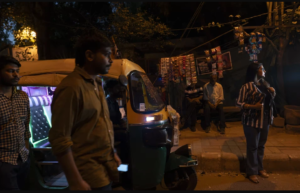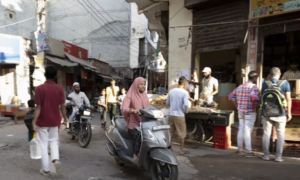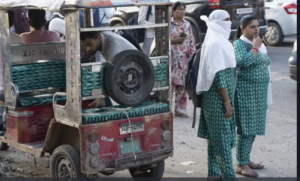
Many Indian women have to take protective measures almost every day when they go out and are always ready to deal with sexual harassment.
Ajita Topo is a chef in an affluent neighborhood in Delhi, India. When she leaves work in the evening, she holds her bag like a shield to her chest, clenches her fists, and carries a black umbrella with a very sharp tip to avoid being attacked.
No matter how hot it is, Topo wears multiple layers of clothing to prevent anyone from touching her breasts. She also uses a sharp metal bar to hold her hair in place, and will use it as a weapon if necessary.
According to The Wall Street Journal, Topo’s actions are not redundant. In 2023, she was followed by two men when she left work after 10 p.m. To fool the two men, she shouted as she passed houses with guards outside.
“Workplace, public transport, public places, I don’t feel safe anywhere. The only solution is to always be vigilant,” said Ms. Topo.

The Inherent Problem
For many Indian women, taking steps to protect themselves from violence and harassment and reassuring their families that they are safe while they go to work is routine. For some, it is central to their daily lives.
In August, a trainee doctor was raped and murdered in the city of Kolkata. It is another warning to women who go to work every day. Danger lurks everywhere, from the quiet corners of hospitals and companies to public transport and the streets.
According to the International Labour Organization (ILO), only 30% of women in India between the ages of 15 and 64 will be in the workforce by 2022. This is believed to be because many conservative families do not want women to go out to work.
A decade ago, after a 23-year-old woman was gang-raped on a moving bus, India’s laws on crimes against women were amended. But women’s rights activists say that in many Indian households, patriarchal attitudes have not changed significantly. This is also the root of widespread violence against women, both inside and outside the home in the country.
Statistics on sexual assault show that Indian women are more likely to be raped by a family member, boyfriend or friend than by an employer or stranger. However, the sexual harassment cases that make the headlines are often those that occur when women are at work, leading many women to believe that they are safer at home.
A 2019 Pew Research Center survey found that 40% of Indians believe marriages are better when men are the breadwinners, while women do the housework and take care of the children. This is significantly higher than the global average of 23%.
Some Indian women choose to quit their jobs as soon as economic conditions allow, while many others prefer to take low-paying jobs close to home.
Economists and researchers say that the low participation rate of Indian women in the workforce is depriving the Indian economy of an important growth engine.

I dream of a day…
There have been a number of recent incidents of crimes against women. Recently, several female call centre operators were attacked and murdered while working the night shift. In 2023, a receptionist disappeared from the hotel where she worked and was found dead a few days later. Each time such an incident occurs, many women experience a major shock and face new fears.
For women working in the healthcare industry, late night shifts and long working hours are commonplace. However, the attack in Kolkata has created a particularly poignant warning.
Amrita Bhattacharya, a resident doctor at a hospital in Kolkata, said that she used to feel comfortable walking the distance from her workplace to the women’s accommodation provided by the hospital. Now, she has to ask a male colleague or friend to accompany her.
Previously, Ms. Bhattacharya used to be annoyed by the rules at her residence, which included locking her door after a certain hour.
“But now, after that horrific incident, I feel that the lockdown is necessary. It is stressful to face such fear every day,” Ms. Bhattacharya said.
Faced with the dangers, many women have opted for safer travel methods such as using personal vehicles to get to work or using ride-sharing services that have safety measures. However, the feeling of insecurity persists.
Ms. Vidhi Pandey commutes nearly 90 minutes from her home in Gurgaon to her office in the capital New Delhi and regularly attends evening events. If she has international clients, her workday can end at 2 a.m. “Although my husband and mother are used to my irregular working hours, announcing that I will be in the office late at night still keeps them up at night,” Ms Pandey said.
Worried about her child, Ms Pandey’s mother often advises her to find a job closer to home and accept a lower salary.
Vidhi Pandey sometimes calls her mother or friends during taxi rides to ensure safety. When booking a taxi, Ms Pandey checks the ratings and reads passenger feedback about the driver’s behavior. If she is wearing a skirt, she finds something to cover her legs before getting in the car to go home.

She kept the Delhi National Capital Territory Police panic button app open on her phone throughout the trip. The app, called “Himmat” which means “courage,” allows users to quickly send an alert to the Delhi Police, along with a link to the user’s location on Google Maps, as well as notify family and friends.
“I kept thinking about how to escape if something went wrong. I dreamed of a day when our society would be safe enough for me to travel alone anytime, anywhere without fear or anxiety,” Pandey said.




